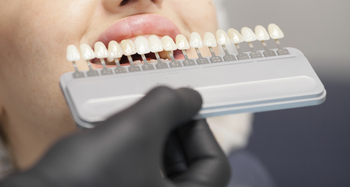Introduction
Navigating the realm of cosmetic dentistry can be overwhelming, particularly when trying to understand how various treatments transform smiles. The question many have is, “How do veneers work?” Dental veneers have gained significant attention over the years, promising an impeccable, symmetrical smile. Essentially, veneers are thin, tooth-coloured shells made predominantly of porcelain or composite resin, designed to cover cosmetic imperfections on the front surface of teeth. When imperfections like chipped teeth, severe discolouration, or unusually shaped teeth challenge the appearance of your teeth, veneers become the cosmetic dentist’s artistry in play. They’re permanently bonded to your natural teeth through a meticulous process, offering a durable solution that can last more than a decade with proper care.
What Are Veneers?
Veneers are, at their core, thin layers designed to cover the front surface of teeth. These cosmetic tools are specifically crafted to improve the appearance of your teeth, addressing cosmetic occurrences such as chipped teeth, severe discolouration, or unusually shaped teeth. There are primarily two types of veneers: porcelain and composite. Porcelain veneers, sometimes called “dental veneers” or “traditional porcelain veneers,” are crafted in a dental laboratory and are known for their durability and stain-resistant properties. On the other hand, composite veneers are sculpted from composite resin materials directly onto the teeth during a dental appointment.
The journey of dental veneers in cosmetic dentistry dates back more than a century. However, their true revolution began in the late 20th century. Initially, veneers were less durable than they are now. The earlier versions were meant to be temporary solutions, offering movie stars short-term smile enhancements. However, advancements in dental technology and materials, particularly the evolution of dental cement, have made modern veneers a long-lasting solution to various cosmetic imperfections, allowing individuals to flaunt a symmetrical smile with confidence.
Why Do People Opt for Veneers?
Why Do People Opt for Veneers?
Cosmetic dentistry, a realm that continually evolves, offers many solutions to enhance one’s smile, and among its triumphs are dental veneers. So, why do so many individuals choose veneers as their go-to solution?

Firstly, the aesthetic improvements are undeniable. Veneers, be they porcelain veneers or their composite counterparts, present a front surface artfully designed to mirror teeth’ natural look and feel. These tooth-coloured shells are crafted to align with the unique shape, size, and shade of the individual’s natural teeth, making for a harmonious and symmetrical smile.
Secondly, one cannot understate the transformative power of veneers when it comes to chipped teeth and severe discolouration. Regular teeth brushing might not eliminate certain stains, but a stain-resistant porcelain veneer can mask them with finesse. Moreover, the front surface of teeth marred by cosmetic occurrences, such as minor misalignments or gaps, can be seamlessly masked by veneers, offering the individual an unblemished appearance of their teeth.
Additionally, while cosmetic dentistry often focuses on aesthetics, veneers serve a functional purpose. Beyond masking cosmetic imperfections, they lend strength to weakened or eroded teeth, ensuring that the individual doesn’t just sport a beautiful smile but maintains oral health for over a decade, if not longer.
The Procedure for Getting Veneers
Understanding how dental veneers work is essential for anyone considering this popular cosmetic dentistry procedure to address cosmetic imperfections. The process is typically streamlined and entails several key stages:
Initial Consultation
At your first appointment, your dentist will discuss your desired results, specifically the appearance of your teeth post-procedure. For many, achieving a symmetrical smile free from severe discolouration or misalignments is the goal. An examination of your teeth follows, wherein the dentist evaluates the health and suitability of your teeth for veneers. A treatment plan tailored to your needs will be crafted based on your unique cosmetic concerns and dental health. This session often includes insights into whether porcelain or composite veneers might be the optimal choice for your scenario.
Preparation
This stage involves making your natural teeth ready for the veneers. Often, a thin layer from the front surface of the teeth is removed, ensuring that the veneer sits seamlessly on top. After reshaping the tooth, an impression is taken. This mould, sent to a dental laboratory, aids in crafting the veneer to the exact shape and size of the tooth. Another integral part of the preparation is the selection of the veneer colour. A shade that blends seamlessly with neighbouring teeth ensures a natural-looking result.
Application
The application involves etching the tooth’s front surface to enhance bonding. A bonding agent, typically dental cement, is applied to the tooth. Following this, the veneer, whether a porcelain veneer or a composite resin variant, is carefully placed and shaped on the tooth. To ensure it’s securely attached, a special light is used to cure and harden the bonding material, permanently bonding the veneer to the tooth.
Final Adjustments
The dentist trims any excess material after the veneer is securely placed to ensure a precise fit. The bite and fit of the veneer are meticulously checked, ensuring optimal comfort and function. A final polish bestows a natural shine to the veneer, concluding the procedure. With proper care, veneers can beautify one’s smile for over a decade, masking stains, chips, and other cosmetic occurrences with elegance.
Advantages of Dental Veneers
Dental veneers have become a go-to solution in cosmetic dentistry, addressing various cosmetic imperfections with remarkable results. Here are some of the primary advantages:
Natural Appearance
One of the chief advantages of dental veneers, whether porcelain veneers or composite veneers, is their ability to mimic the appearance of natural teeth. Crafted to match your teeth’ shape, size, and colour, they seamlessly blend in, offering a symmetrical smile indistinguishable from your natural tooth. The front surface of veneers is designed to reflect light similarly to tooth enamel, giving recipients a genuine, radiant smile.
Stain Resistance
Porcelain veneers, in particular, are renowned for their stain-resistant properties. Unlike natural teeth, which can get discoloured from beverages like coffee or red wine, veneers maintain their pristine colour. This advantage means fewer worries about severe discolouration and a consistently bright smile over the years.
Minimally Invasive Procedure
While traditional dental procedures might require significant tooth structure removal, dental veneers typically involve only a minor reshaping of the front surface of the teeth. This characteristic makes the procedure relatively straightforward and less intrusive, without needing more in-depth treatments like a root canal.
Boost in Self-confidence
Addressing cosmetic occurrences such as chipped teeth, severe discolouration, or misalignments, veneers offer transformative results. The immediate enhancement in appearance invariably leads to a significant boost in self-confidence. Patients often find themselves smiling more, feeling more comfortable in social situations, and experiencing an overall uplift in their self-esteem.
Long-lasting Results
Veneers are not just a temporary fix. Dental veneers can last for more than a decade with proper care, including regular teeth brushing and avoiding extreme pressures on them. This durability, combined with their ability to resist stains and maintain a natural appearance, means recipients can enjoy the benefits of their veneers for years to come.

Potential Risks and Considerations of Dental Veneers
While dental veneers have gained immense popularity in cosmetic dentistry due to their transformative effects on the appearance of your teeth, it’s essential to understand the associated risks and considerations.
Tooth Sensitivity Post-procedure
After the cosmetic dentist trims the front surface of the natural tooth to accommodate the veneer, the tooth underneath may become sensitive to hot and cold foods or beverages. Removing a thin layer of tooth enamel can sometimes lead to increased sensitivity, although this is often temporary.
Potential for Veneers to Detach
Although veneers are permanently bonded to the teeth using dental cement, there’s still a slim possibility that they might detach. This risk can arise if there’s an issue with the bonding process, the dental cement doesn’t set properly, or excessive force is applied to the veneer. Regular dentist check-ups can help identify and rectify such issues promptly.
Irreversibility of Tooth Preparation
Placing traditional porcelain veneers typically involves removing a portion of the tooth enamel. Once this enamel is removed, the process is irreversible. The natural tooth structure is permanently altered, and there’s no way to revert to the original state without using other dental procedures like dental crowns.
Cost Considerations
Porcelain veneers and even composite veneers can be a significant investment. The veneers’ cost can vary depending on several factors, including the expertise of the cosmetic dentist, the dental laboratory used, and the region. When considering the investment, it’s essential to evaluate the long-term benefits and potential need for replacements.
Lifespan of Veneers and Potential for Replacement
Veneers, whether porcelain or composite resin, are not lifetime solutions. Even with optimal care, including teeth brushing and avoiding cosmetic occurrences like chipped or broken teeth, veneers might require replacement after over a decade. The veneer’s lifespan can be influenced by factors like oral hygiene, dietary habits, and how dental veneers work in synergy with neighbouring teeth and the individual’s bite.
Caring for Your Veneers
Routine Dental Hygiene
The foundation of veneer care rests on maintaining standard oral hygiene practices. Regular teeth brushing, using a soft-bristled brush, ensures the front surface of the veneer remains stain-resistant. Incorporating flossing is crucial, too; it keeps the neighbouring teeth healthy, supporting the veneer’s longevity.
Avoiding Hard or Sticky Foods
While veneers are durable, they aren’t invincible. Consuming hard or sticky foods can jeopardise their integrity, leading to cosmetic occurrences like a chipped tooth or dislodging the veneer from the front surface of the natural tooth.
Regular Dental Check-ups
Seeing your dentist regularly ensures that any potential issues with the dental veneer, like detaching or minor wear and tear, are identified and addressed early. The dentist evaluates the veneers’ fit, function, and appearance during these visits.
Using Non-abrasive Toothpaste
To maintain the veneer’s stain-resistant properties, using non-abrasive toothpaste is recommended. Abrasive pastes can scratch the porcelain veneer or composite resin surface, diminishing its shine.
Avoiding Excessive Force or Pressure
Whether you’re biting into an apple or clenching your teeth, applying excessive force can harm the veneers. Being mindful of such actions protects them from unexpected damage.
In conclusion, while veneers redefine cosmetic imperfections and offer a symmetrical smile, their longevity depends on how they’re cared for. Adopting these practices ensures they remain a radiant asset in your smile for years.
Conclusion
Dental veneers have revolutionised cosmetic dentistry, providing a robust solution to many dental imperfections. From severe discolouration to chipped teeth, veneers have been the go-to solution for individuals seeking to enhance the appearance of their teeth. Beyond aesthetics, the confidence boost they offer is immeasurable. However, as with any dental procedure, the key to success lies in thorough consultation and personalised advice. An experienced dentist at Infinity Dental Care can evaluate whether veneers are the best option for your needs. Are you interested in exploring the potential of veneers for your smile? Don’t wait; contact us today at (02) 9159 6237!
References
Smile makeover with direct composite veneers https://www.ncbi.nlm.nih.gov/pmc/articles/PMC6076883/
Porcelain for veneers https://pubmed.ncbi.nlm.nih.gov/9893514/

